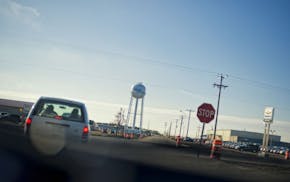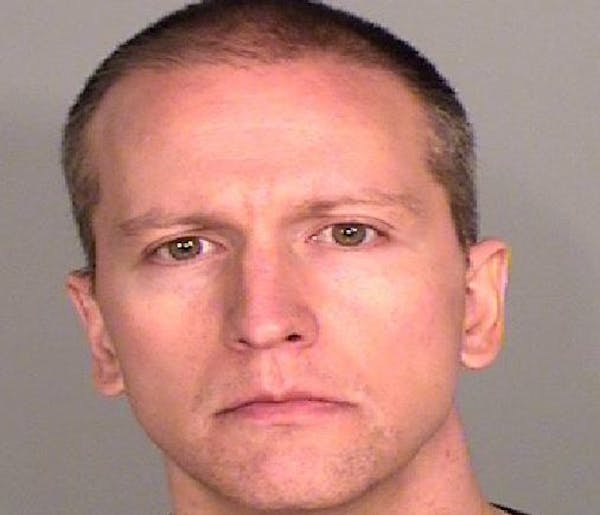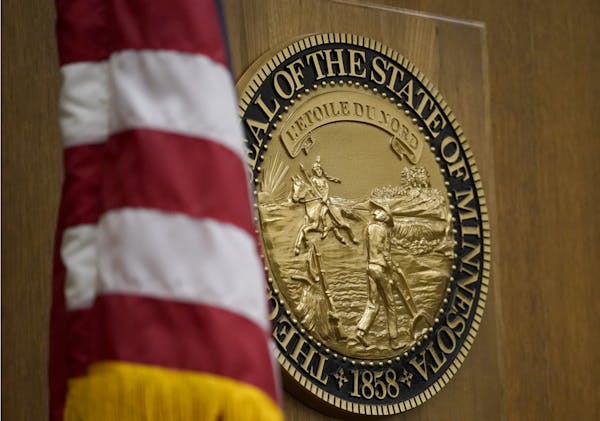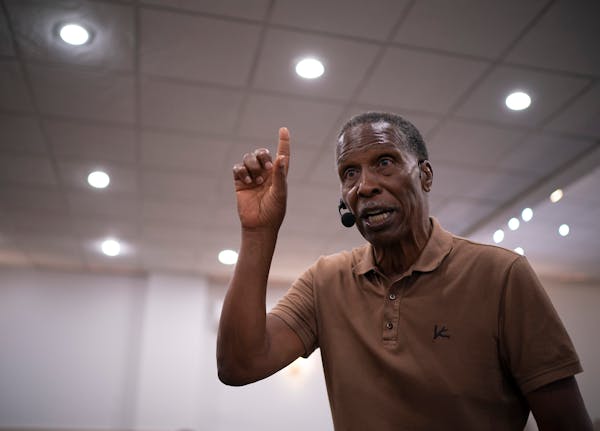Halfway through Pastor Curtis Farrar's Sunday service in the parking lot of his church at 38th Street and Chicago Avenue, he quit talking to the congregation and spoke directly to the men who stand at the intersection's northeast corner day after day.
"Young man across the street, I told the Lord I will preach until the day I die because I want to see as many young men, like some of us, right in here," he said, his voice reverberating over loudspeakers across the intersection now known as George Floyd Square. "It doesn't matter how tough you may be, what you do, what you may be carrying. We used to pack, too."
Some members still carry guns, even in church, Farrar quipped to laughs. "You out there, we'll wait for you. Come on! Come on from across the street. You heard me."
Thirty-nine years ago, when Farrar started Worldwide Outreach for Christ opposite what is now the Cup Foods convenience store, the area was strictly Bloods territory, he said. He started reaching out to gang members using his own story: In the 1970s, Farrar made $3,000 a day selling cocaine. He gave his own brother the drugs that killed him, and was beaten within an inch of his life by police mistaking him for somebody else. Nursing a cracked skull, he stayed up 19 hours mainlining cocaine until he thought he was going to die and turned to religion out of sheer desperation.
Church members used to stand on the corner with signs offering passersby prayers. They hosted food giveaways and school supply drives. Neighborhood crime declined over the decades. Young suburbanites moved into the historically Black community, but the gangs never fully disappeared.
"I used to walk up and down this street to buy drugs," said Tracy Gordon, who lived in the neighborhood 17 years and credits the church for her sobriety the past 15. "Drugs on the corner, drugs in the alley, drive-by shootings, this corner was a struggle. Before I was an addict on this corner, now I come back and give my testimony."
When George Floyd died here under the knee of a police officer last summer, the city installed concrete barricades to protect crowds from traffic. Protesters reinforced them with rows of bike racks and angled iron barriers known as Czech hedgehogs, blockading the street for 10 months in hopes of winning 24 demands they penned in a "justice resolution."
Church members say they appreciate the Floyd memorial, but not the occupation.
"I don't understand how that's honoring someone that was murdered right there, by blocking everything off," said Kim Hollman, who drives down the alleys to avoid the activist gatekeepers.
"I don't know the people at the gates. I don't even know where they're from. They pick up our dumpster, take it and block the alley. What are y'all doing?" asked Clyde Willrich. "They supposedly do security around here. They don't mess with the drug dealers and gang members though, but they want to mess with the church. Come on now."
Gunshots pop off at night, Willrich said. People sit in the church parking lot smoking weed. Random cars get stowed there. Tow companies refuse to enter the square, so church members with trucks move the cars themselves.
A few weeks ago, the Sunday after Imez Wright was slain in front of Cup Foods, a man drove up and told them they couldn't have a service because the square was closed, and they'd been "warned."
"I'm not trying to hear all of that," Willrich said. "We've been here too long for people that have no idea where they get their authority from to be telling us what to do."
Farrar watches the trial of Derek Chauvin alone on a laptop in his modest basement office. Footage from the church's security cameras plays constantly on the wall.
Regardless of the outcome of the trial, Farrar worries about the future of 38th and Chicago now that the gang is growing again. Like the Black business owners of the square, Farrar said no one asked his congregation's consent before turning 38th and Chicago into a "gated community."
Richard Lee, a Chicago transplant who used to be part of the Gangster Disciples, sought religious intervention from Worldwide Outreach for Christ after drinking and crashing his car one night in a nearly fatal accident. He encourages the younger men on the east side of 38th and Chicago to step away from the corner and come to church. They rarely have the patience to hear him out, he said. He just hopes they'll remember the offer when they hit rock bottom.
"What I can see in those young men — because I was once upon a time doing the same thing — is they're hurt," Lee said. "You got a lot of pressure on you from your friends in the streets."
When the weather is good, the church has services outside. Rain or shine, it has hosted cookouts and a healing circle every Saturday of the trial.
Not all of the church's parishioners have troubled pasts. But the pastor has a way of bringing in people with trauma, said Hakim Cook-Bey, a former Vice Lords member who grew up in Chicago and fled to Minneapolis before finding a measure of inner peace from the church.
"If it wasn't for Pastor Curtis, I wouldn't be where I'm at, changed. I'm never going back to prison. I can't change my past, but God has changed my future," he said.
Cook-Bey isn't watching the trial. He's seen many Black men killed by police with nothing done until it's politically necessary, he said. He's more concerned about the neighborhood, and the barricades that give "sanctuary" to the gang.
"This area has been under gang violence for way before George Floyd," he said. "But the church has held its ground. We're going to keep speaking against injustice."
Susan Du • 612-673-4028
He grew up legally in Minnesota, but immigration law gap may one day force student to leave

911 transcript gives more detail of Sen. Mitchell's alleged burglary

U.S. Bank Stadium gets new executive director
New police chief in Columbia Heights will start work Friday



